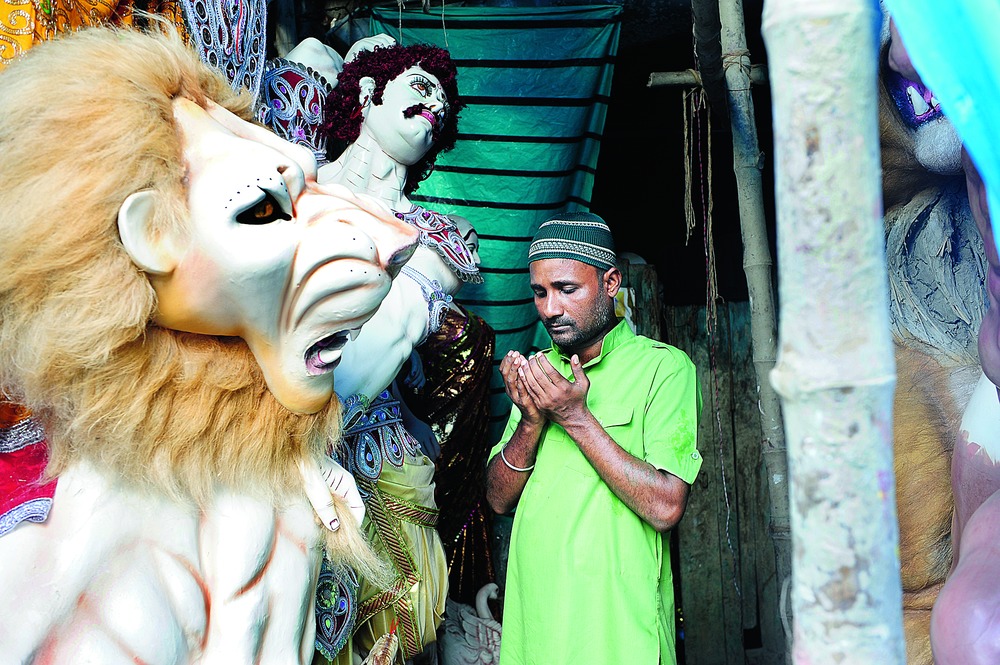

On Mahasaptami, Sheikh Jahangir gets up well before the sun, walks to the ghat - a 12-minute distance - barefoot, bathes the kalabou of bended head and lush limbs, carries her back to the pandal, bedecks her in the auspicious gorod and, having declared the Durga Puja open, leaves for namaz.
This has been Jahangir's routine for the past many Pujas.
The community Puja at Munshiganj in Kidderpore, has been around for years; no one remembers how many. But the task of organising it and doing the puja itself fell on the Muslim brethren about 20 years ago. The man in charge was Shahid Ali, Jahangir's mama.
Shahid grew up in this very locality. He saw his family participate in Hindu festivals. He experienced it himself - the freshly cut fruits for prasad on Saraswati Puja, the rhythm of the dhak and dhunuchi naach at Durga Puja, the colours of Holi. It was a way of life.
One day, as a young man, he was watching his idol-maker friend Ram Pal give the final touches to a Durga murti. "He turned to me and asked semi-jokingly: 'And who will worship this goddess?' I said I would, immediately," says Shahid. "Since then I have been worshipping the goddess with full devotion. But lately, I have not been well. So, my nephew has taken over."
Four years ago, when Jahangir undertook the duty of a priest at the Munshiganj Durga Puja, many of his friends were doubtful. Can a devout Muslim perform Hindu rituals, they thought aloud. "I tell them, religion is man-made. If I were a doctor, would they ask why I am treating a Hindu? I will do what I feel is right," says Jahangir.
The Pujas are still a good fortnight away - at the time of writing this story. The pandal, at the mouth of a narrow alley, is still taking shape. Children are flying kites, some teenagers are playing cricket. Two middle-aged men stand inside a tiny eatery opposite the pandal. They are threading chunks of beef onto skewers. Inside Five Star Club, the official body that organises this Puja, a bunch of young people bond over cups of milky tea. "Except two, all the organisers are Muslims, and they don't touch beef for those five days," Jahangir points out. He himself gave up beef four years ago. Mohammad Islam, the owner of the eatery, does not sell beef items during the Pujas. "It's a big event and we all participate wholeheartedly," he says.
A big event with a small pandal, Jahangir ensures you know. "Can you see how small? It was bigger even a few years ago." We are inside his room, which is almost an extension of the pandal, or you could say the other way round. Jahangir is looking for a piece of paper. Pictures of him with cricketers Irfan and Yousuf Pathan adorn the pink walls. He is cricket crazy, he says shyly.
On a wooden shelf rest clay idols of Lakshmi and Ganesh garlanded with fresh flowers. There is also a photograph of a shivling, which he has brought from Tarakeswar. "I go there every year in Shravan (June)." The cheap plastic wall clock has a picture of Radha Krishna emblazoned on the dial. " Aap itna hairan kyun ho mujhe samajh nahi aa raha hai (I don't know why you find this surprising)," he says. He is talking about my wonderment at this twinning of two otherwise conflicting faiths. "Hairani ki baat ye hai ki hame koi sponsor nahi milta (What is surprising is there are no sponsors for this Puja)," he mumbles.
Munshiganj is a stone's throw from Metiabruz. The same Metiabruz that Nawab Wajid Ali Shah made his home after being chased out of Awadh by the British. About a hundred people live here, most of them Muslims. But the enthusiasm for Durga Puja isn't restricted to those with families; it pervades the nearby brothel too. The sex workers, all Muslims, prepare the ritual dadhi karma, cut the fruits, decorate the idol and dance their heart out every day for five days.
"They also help raise funds - they request their clients to pay extra," says Premnath Shaw, club president and one of the two Hindu committee members. Jahangir rues: "This year we collected only Rs 1.10 lakh." Shah points out how the sex workers take part in the sindoor khela, a Dashami ritual meant for Hindu married women. "We have a lot of fun. Hum sab ek saath Ma ka puja karte hain (We all come together to pay obeisance to Ma)," says one sex worker, as she paints her nails scarlet.
Often, the last day of the Pujas coincides with Muharram. "We serve khichda to all in front of the pandal. The tazia passes peacefully, stopping before the pandal for a brief bit as a mark of respect," says Jahangir. "But everything costs money. And we..." he lapses into his pet lament once again.
Who knows, perhaps Ma Durga will steer Jahangir's one-of-a-kind Puja out of trouble soon.











